Matthew Yglesias's Blog, page 2309
May 16, 2011
Liberté, Egalité, DSK
Fail:
Speaking to the same broadcaster, Eva Joly, a well-known French magistrate and leader of the French Green Party who is expected to run for in next year's presidential election, agreed that "these are very violent images." She added that the American justice system "doesn't distinguish between the director of the I.M.F. and any other suspect."
I doubt Joly actually has this right, but certainly a system in which all are equal before the law is something we should be aiming for.


Affordable Care Act Litigation And Judicial Review

I've long been a bit skeptical of the merits of American-style strong judicial review as an institution. The practice is associated with some important human rights gains, including Brown v Board of Education and Roe v Wade, that have normally made it venerated among American liberals. But this kind of outcomes-oriented case doesn't withstand a ton of scrutiny. After all, almost 100 years before the Supreme Court helped lead the civil rights revolution it was the Supreme Court that invalidated 19th century civil rights law. So I'm glad to see Dahlia Lithwick putting this issue on the table and discussing Jeremy Waldron's case against judicial review.
That said, I'm not actually sure that the Affordable Care Act legislation that she's uses as her example to kick the discussion off really illustrates the point very well. At the end of the day, the only reason the ACA legislation is even a little bit interesting is that the congressional coalition behind the ACA lost so many seats. If the votes for ACA were still there in congress, then an adverse ruling on the individual mandate would be irrelevant—it would be simple to do a patch that accomplishes the same thing as the mandate without specifically triggering the red herring objection about "regulating inactivity." The problem is that the votes wouldn't be there. And if you look at the most plausible alternatives to the American system, you'd be looking at something like Canada's "notwithstanding" clause that allows a legislative majority to overrule a judicial decision. But the political support to invoke such a clause wouldn't exist today were the law struck down.
More generally, I think the biggest element of the American political system that hyper-empowers judges actually isn't our unusually strong judicial review, it's our unusually cumbersome legislative process. If the Supreme Court strikes down the prevailing statute that attempts to limit corporate influence over elections, we don't just pass a new law that steers clear of the constitutional issues they raised. We do nothing. And if the Supreme Court issues an interpretation of a statute that makes it extremely difficult for people to in practice enforce their rights, we don't pass a new law clarifying the rules. We do nothing. That's because we live in a country whose political system is overwhelmingly biased toward inaction. That, in turn, winds up making every judicial decision higher-stakes than it should be.


"Corporate" Education Reform

One exciting piece of new jargon I've noticed lately from education reform proponents is to just tack the word "corporate" on to the phrase. Lots of Americans are committed progressives with no particularly strong view about education policy so when they hear that one faction of people favors "corporate education reform" they're inclined to think it's a bad idea. So, for example, not only does this guy think I was only getting what I deserved when I was randomly assaulted the other night, he thinks that the appointment of new New York State Education Commissioner John King, Jr represents "Meet the new corporate ed deform boss, same as the old corporate ed deform boss."
And of course it's true that King is the current Deputy Commissioner so we're unlikely to see major change here. But what's "corporate" about King? Right now, he's a public servant working for New York State government. Previous to that he was the director of Uncommon Schools, a non-profit charter school operator. Before that, he founded Roxbury Prep Public Charter School in Boston. Before that, he was a high school history teacher in Boston and before that he was a high school history teacher in San Juan, Puerto Rico. This is a very strange way to go about foisting a nefarious corporate agenda on American education. It actually looks to be suspiciously like John King, Jr has a perfectly sincere interest in educating poor children in the United States and that this has been the driving force of his entire career.
Reasonable people can differ, of course, about how to improve school quality. But beware apologists for the status quo bearing jargon about "corporate" reformers and the like.


Licensed To Braid
A good Economist column about run-amok licensing in aesthetic personal services offers the example of hair-braiding in Utah:
Jestina Clayton is an African hair-braider with 23 years of experience. But the Utah Barber, Cosmetologist/Barber, Esthetician, Electrologist and Nail Technician Licensing Board told her that she cannot practise her craft unless she first obtains a licence—which means spending up to $18,000 on 2,000 hours of study, none of it devoted to African hair-braiding.
The column ends by noting the failure of a bill to relax this sort of thing in Florida "despite" the recent election of a cavalcade of rightwing politicians there. But of course there's very little that's surprising about this. Not only is interest group support for irrational licensing strong, but there's no particular "rich people get more money" angle in pushing deregulation. It's a nice thing to talk about and a good example of how big government isn't always on the side of the little guy, but there's meager incentive to do anything about it.


Declining Taxation Of The Super-Wealthy
The 400 richest taxpayers in America pay a higher effective income tax rate than do the rest of us, but the gap is small and shrinking according to a new analysis from Rob Williams (via Catherine Rampell):
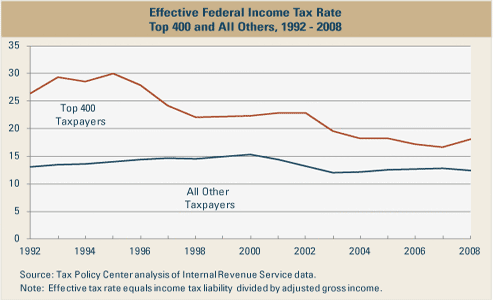
It's true that the overall share of the tax pie being paid by the very rich has increased during this period. That's because notwithstanding falling tax rates, their share of pre-tax income has grown so quickly that their share of overall taxes is increasing.


House Democrats Make a Comeback In Generic Ballot
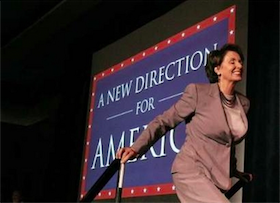
Not only am I old enough to remember when picking Nancy Pelosi to stay on as Minority Leader doomed Democrats to never regain the majority, I'm old to even remember way back in 2005 when choosing her made it impossible for them to take it in the first place. And today:
The Democrats lead in the generic Congressional ballot by a single point, 42% to 41%, with 16% undecided—well within the survey's margin of error. And yet the trend is unmistakable, as this represents a six-point turnaround from the Battleground survey of late October 2010, where voters supported Republicans by a five-point margin, 47% to 42%. In addition, intensity of support favors the Democrats as well, with 39% supporting a generic Democrat strongly and 37% supporting a generic Republican strongly; also a noticeable shift from last cycle when an enthusiasm gap dogged the Democrats. Now, key swing subgroups of the electorate are veering away from the Republicans. Voters in the Midwest went from R+6 in October to D+8 today. Independents, who were R+14 in our October survey and whom Republicans won nationwide by 19 points in the previous election, now support a generic Republican by just three points. Voters age 35-44 were R+8 and are now D+20. Non-college educated men have gone from supporting the Republicans by 15 points to supporting them by just eight points. Republicans are losing ground among seniors as well and fail to win majority support among them today. Seniors were R+17 in our October survey and R+21 on Election Day and are now R+10. Democrats will still need to work to get their voters out to vote. There remains an intensity gap with 80% of Republicans extremely likely to vote compared to 74% of Democrats including only 53% of young voters, 60% of Latino voters, and 61% among single voters.
It's worth noting that the vote to end Medicare is a real gift to Democratic Party House challengers. It's not so much that ending Medicare is an unpopular idea (though it is) as it is the fact that this gives a challengers a big big policy target to name if they want to say "sure I'm not as liberal as Barack Obama, but unlike Rep Seniorkiller over there I don't want to leave seniors to the tender mercies of a stingy subsidy to insurance companies."


Liberal Leviathan
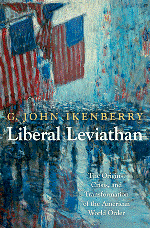
When I was writing my own book, I needed a good abstract guideline of a sound approach to foreign policy and basically what I went with was ideas stolen from John Ikenberry's After Victory: Institutions, Strategic Restraint, and the Rebuilding of Order After Major Wars. That book was written in 2000, though, so the idea-stealing process mostly involved trying to guess what the implications were for Bush-era conduct. With the release of his new book, Liberal Leviathan: The Origins, Crisis, and Transformation of the American World Order the guessing game can end and you can read for yourself.
The two books have a fair amount of overlap in terms of theoretical content, so if you've already read the first one you'll probably want to skim a bit through the second one to get to the new stuff. Conversely, if you haven't read his earlier book and are more interested in contemporary issues than historical ones, Liberal Leviathan gives you what you want to know. The basic idea, in either case, is that during the Cold War the United States built up a liberal hegemony inside the "western camp" that was based on rule-government leadership and the goal for the contemporary situation should be to bring that model to the entire world. The Bush administration, especially until 2005 or so, had the very different idea of trying to create a hegemonic world order. But they failed, and now we need to go back to the earlier, better idea.


The Disparate Racial Impact Of a Poll Test
Duncan Black is more sanguine than I would be about the full implications of Newt Gingrich's proposal to revive poll tests of the sort barred by the Voting Rights Act:
I think they're a horrible idea for a variety of reasons, though I do think honestly administered poll tests (not that they would be) wouldn't necessarily have all that big of an impact on the racial distribution of people who could actually vote.
I think that's wrong. It's important to return to Gingrich's exact words:
I always say that to become an American citizen, immigrants ought to have to learn American history. But maybe we should also have a voting standard that says to vote, as a native born American, you should have to learn American history. You realize how many of our high school graduates because of the decay of the educational system, couldn't pass a citizenship test.
What he's saying here is that he wants to implement a test that woud be difficult enough for some non-trivial share of the American public to be disqualified, specifically the graduates of low-performing high schools. And it's no secret that African-Americans and Latinos are disproportionately concentrated in said schools. And, indeed, the 2006 History NAEP shows significantly lower scores for blacks and Hispanics:
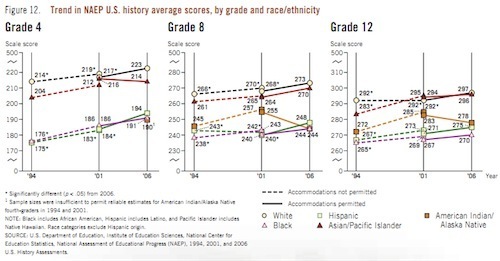
(click for larger image)
Now I suspect that part of the racial politics here is that Gingrich wants me to point this out so that he can go snigger about how liberals now admit that black people are dumb. But the reality is that it's just as Gingrich said in his talk—we have a lot of problems with poorly performing schools in the United States. It's also true that African-American and Latino kids disproportionately attend those schools. And that means that if you apply a test-based criteria for citizenship, you're going to get many fewer voters from non-white households. This would be a great way of dealing with the medium-term demographic challenges facing the part of white people, but it's also repugnant.


Confirmation Bias And Economic Knowledge
Daniel B. Klein and Zeljka Buturovic did a study about a year ago that you may have heard about which purported to show that self-identified liberals and progressives had lower levels of understanding about economics. One response that occurred to me at the time was that the survey's questions seemed to have been selected so as to ensure that the left-wing answer was also the wrong one. Now they've run a new study with different questions and the results appear to indicate that the gap is, indeed, all about which questions you ask:
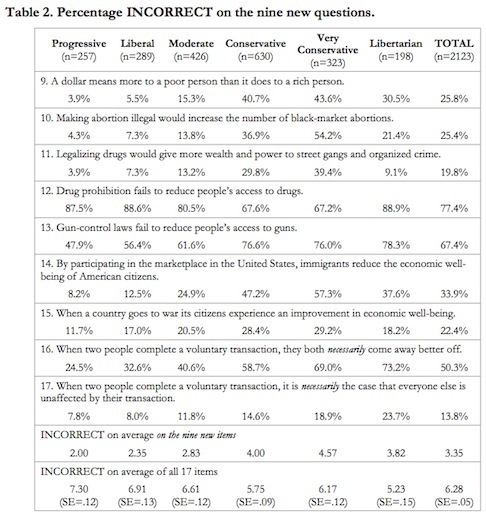
Basically when you ask questions where the left-wing answer is also the one supported by economics, suddenly left-wing people have a better understanding of economics. But when you ask the other set of questions, it comes out the other way. Basically, there's a lot of confirmation bias out there. This is why I think people who teach economics ought to think harder about their choice of examples when teaching.
Identity Politics In 1940
Seth Masket offers a fascinating quote from Wendell Wilkie on the campaign trail in 1940, slamming out-of-touch elitist Franklin D Roosevelt:
The charge I make against Franklin Roosevelt is that he has lost that confidence. Franklin Roosevelt has lost faith in the American people. Just look at the men surrounding him. They are cynics who scoff at our simple virtues. They think that the people are too dumb to understand democracy. Their idea is that they, the intelligentsia, can govern us with catch phrases and sleight-of-hand.
Apparently this same basic campaign theme has been running through presidential politics since the 1920s (things were different earlier), which is a reminder that it's a mistake to overrate the importance of any one candidate's attributes. Bill Clinton, John Kerry, and Barack Obama have very different life stories, but they're all out of touch elitists who don't understand real America and want to impose a vision of technocratic governance and alien lifestyles. So was Franklin Roosevelt.
Matthew Yglesias's Blog
- Matthew Yglesias's profile
- 72 followers



